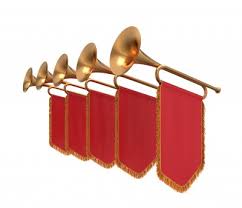
记忆方法
记忆方法:“fanfare”可以想象为“fan”风和“fare”旅行,如同一场繁华的旅行中的鼓乐声,用于庆祝或宣布重要事件,因此“fanfare”表示嘹亮的喇叭声或欢快的音乐。
以上内容由AI生成, 仅供参考和借鉴
中文词源
fanfare 号角齐鸣
拟声词,模仿号角齐鸣的声音。
英语词源
- fanfare (n.)
- c. 1600, "a flourish sounded on a trumpet or bugle," from French fanfare "a sounding of trumpets" (16c.), from fanfarer "blow a fanfare" (16c.), perhaps echoic, or perhaps borrowed (with Spanish fanfarron "braggart," and Italian fanfano "babbler") from Arabic farfar "chatterer," of imitative origin. French fanfaron also came into English 1670s with a sense "boastful."
权威例句
- 1. The company was privatised with a fanfare of publicity.
- 公司的私有化搞得沸沸扬扬。
- 2. The product was launched amid much fanfare worldwide.
- 这个产品在世界各地隆重推出。
- 3. A wreath was laid on the monument to a fanfare of trumpets.
- 在响亮的号角声中花圈被献在纪念碑前.
- 4. A fanfare of trumpets heralded the arrival of the King.
- 嘹亮的小号声宣告了国王驾到.
- 5. The departure of the South Korean prime minister was marked with little fanfare.
- 韩国首相悄无声息地离开了。